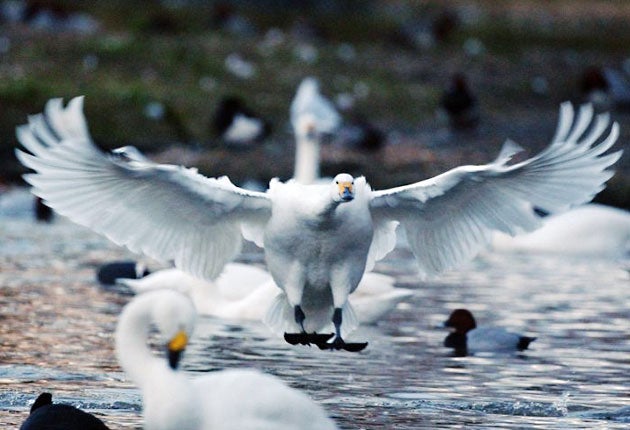Swans stay in 'warm' Siberia
The late arrival in Britain of migratory birds from Russian region is being blamed on global warming, Ian Johnston reports

Your support helps us to tell the story
From reproductive rights to climate change to Big Tech, The Independent is on the ground when the story is developing. Whether it's investigating the financials of Elon Musk's pro-Trump PAC or producing our latest documentary, 'The A Word', which shines a light on the American women fighting for reproductive rights, we know how important it is to parse out the facts from the messaging.
At such a critical moment in US history, we need reporters on the ground. Your donation allows us to keep sending journalists to speak to both sides of the story.
The Independent is trusted by Americans across the entire political spectrum. And unlike many other quality news outlets, we choose not to lock Americans out of our reporting and analysis with paywalls. We believe quality journalism should be available to everyone, paid for by those who can afford it.
Your support makes all the difference.The arrival of thousands of swans fleeing plunging temperatures in their breeding grounds in western Siberia is usually one of the first signs that winter is on its way in Britain.
But wildlife experts are reporting that the swans' 1,800-mile mid-October migration has so far failed tomaterialise, with climate change turning the once famously harsh Russian region into a more inviting winter haven for the majestic birds.
Some 300 Bewick's swans – of the 8,000 or so which usually make the annual flight west to the UK – were expected at Slimbridge Wildfowl and Wetlands Centre in Gloucestershire by 21 October but have not yet been sighted. Such a delay is unheard of. Experts at the centre said the birds appear to have "simply stayed put for longer" as temperatures have not been cold enough to persuade them to come this far west.
The Royal Society for the Protection of Birds (RSPB) said it feared the Bewick's swans could lose their collective memory of where UK wetlands such as Slimbridge are, and be unable to find them again should their alternative eastern holiday destinationssuddenly grow colder. Andrew Parker, a spokesman for the Slimbridge centre, said: "It is unusual for this time of year. It has been a lot warmer for a lot longer, not just here but where they have been. They have simply stayed put for longer and there hasn't been the necessity to come back. It is being put down to climate change.
"It is the first year this has occurred, so we will have to see what develops over the coming years."
Slimbridge is one of the few places in the world where so many Bewick's swans can be seen in numbers at such close quarters. They fly in to the wetlands for daily feeds and take flight in the evening. Staff have named their favourite birds who return time and time again. Perhaps the most famous is Crinkly – so called because of his peculiarly shaped neck. His search for a mate who might love him despite his unusual looks hit the headlines in the UK last year. Staff have been waiting to see if he returns from his travels with a partner. And, for the past three years, a pair dubbed Dario and Dorcas have been the first to arrive.
Grahame Madge, the RSPB's conservation spokesman, said: "This is rather worrying because sites like Slimbridge are needed in very cold winters. There is the fear these birds might lose their connection to a site. There is a collective memory in Europe's 23,000 Bewick's swans. The population remembers from year to year where to go but if it shifts eastwards that could be lost."
Bewick's swans are the smallest swan in the UK. They can also be seen in winter on the Severn estuary, at Nene Washes in Cambridgeshire, and at Martin Mere in Lancashire. The breed is already on the RSPB's amber list, meaning it is not globally under threat but is increasingly threatened by loss of habitat and man's activities.
Join our commenting forum
Join thought-provoking conversations, follow other Independent readers and see their replies
Comments